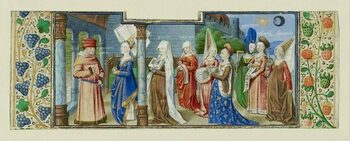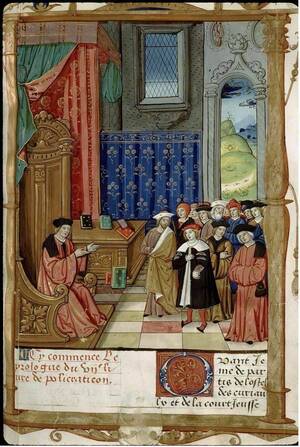From the Medieval Research Blog: "Poetry as a Quadrivial Art?"

“That ‘Poetry is the cradle of philosophy’ is axiomatic”
(John of Salisbury, Metalogicon I.22).
It is a truth generally acknowledged that in the Middle Ages a liberal arts education consisted of the trivium (grammar, logic, and rhetoric) and the quadrivium (arithmetic, music, geometry, astronomy). Poetry –what we might call “literature”– was primarily taught by grammarians and rhetoricians in the Middle Ages. Literary scholars, like Rita Copeland and Marjorie Woods, have therefore been very motivated to study exactly what the language disciplines of Grammar and Rhetoric entailed and precisely how they were taught in order to have a better sense of what the study of literature must have looked like in this period. Their works are indispensable for the study of medieval literature and truly are the bulk of where instruction in poetics lay in the Middle Ages. And yet, once cannot stop there.

Knowing exactly where to put poetry was something that clearly bothered many medieval philosophers. While today we might assume that poetry would clearly be associated with the Trivium, or the arts dedicated to words, specifically grammar and rhetoric, certain medieval thinkers located it within logic and also the Quadrivium, or the arts of number. Understanding why can help us to understand the multi-faceted way in which the medieval mind approached poetry in particular and the literary arts more generally.
In the twelfth century when there were major curricular changes afoot in schools and universities, John of Salisbury maintained that poetry belonged to the art of grammar although it was closely allied with rhetoric. “Art,” writes John of Salisbury, “is a system that reason has devised in order to expedite, by its own short cut, our ability to do things within our natural capacities. Reason neither provides nor professes to provide the accomplishment of the impossible;” Instead, reason pursues the possible by means of an efficient plan, what the Greeks would call a methodon (Metalogicon I.11, p.33).
This is an excerpt from "Poetry as a Quadrivial Art?" by Dr. Lesley-Anne Dyer Williams. Read the full story.
Originally published by at medieval.nd.edu on September 11, 2024.
Latest Research
- Megan McDermott joins ND–IBM Tech Ethics Lab as new Notre Dame directorThe Notre Dame–IBM Technology Ethics Lab, a critical component of the Institute for Ethics and the Common Good (ECG) and the Notre…
- Jenkins Center for Virtue Ethics receives grant to advance love-based ethical frameworkThe University of Notre Dame has received a $10 million grant from the John Templeton Foundation to support a project titled Love and Social Transformation: Empowering Scholars and Social Innovators to Develop the Love Ethic.
- ND-GAIN releases latest Country Index updateThe lastest update to the University of Notre Dame’s Global Adaptation Initiative's (ND-GAIN) Country Index is now live. The ND-GAIN team will release a second Country Index update in late Fall, which includes…
- In sub-Saharan Africa, 1 in 6 cancer medications found to be defectiveSerious quality defects were found in a significant number of cancer medications from sub-Saharan Africa, according to new research from the University of Notre Dame.
- Belfast conference honors legacy of Irish art historian S.B. KennedyMore than 80 people gathered at the Ulster Museum and Queen’s University Belfast on May 22-23 for the conference “New Histories of Irish Art and Modernism.”
- From giving a TEDx Talk to starting a sustainability initiative, one student’s transformational experience in Hong KongWhen Bernice Antoine decided to do a semester abroad in Hong…













